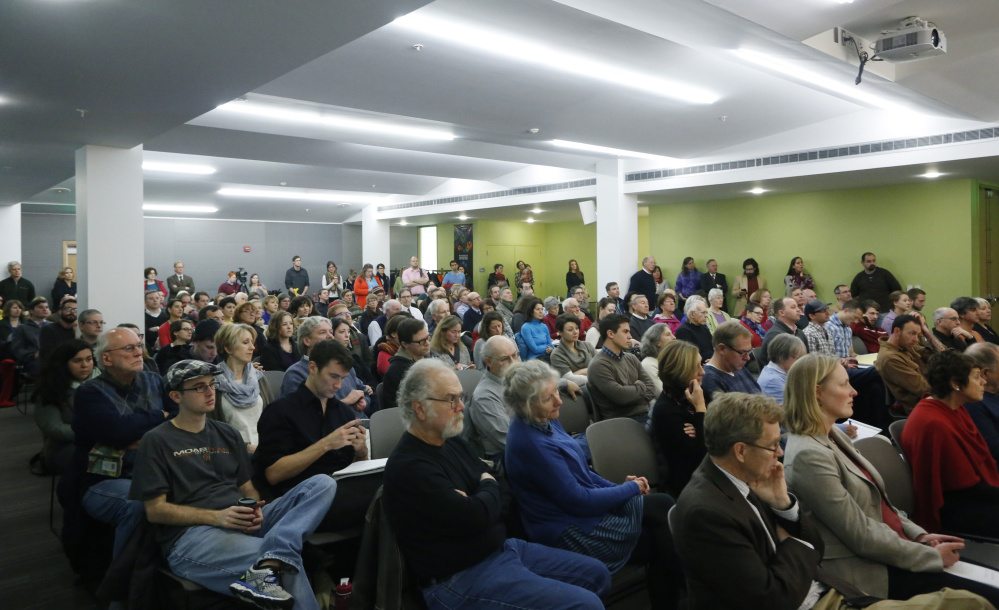Having a tenant advocate in City Hall, requiring more time for eviction notices and creating village centers off the peninsula were some solutions to problems caused by Portland’s rental housing crunch suggested during a forum Thursday at the Portland Public Library.
More than 200 people, including landlords, tenants, developers, activists and city officials, attended the noontime event hosted by the library and organized by the Portland Press Herald, which recently published a six-part series on the effects of the high demand for apartments in the city and resulting skyrocketing rents. The special report, titled “Welcome to Portland: No Vacancy,” detailed the effects of the city’s hyper-competitive rental market, including a 40 percent rise in advertised rent prices in the past five years.
On the forum’s panel, which was moderated by Press Herald Metro Editor John Richardson, were Grace Damon, co-chair of the Portland Tenants Union; Richard Barringer, professor emeritus of community planning and development at the University of Southern Maine; Brit Vitalius, a real estate broker and the president of the Southern Maine Landlord Association, and Portland Mayor Ethan Strimling.
“It’s a serious problem,” said Damon, who called for swift action by the city to address the current situation.
She said people are constantly getting kicked out of their apartments, so landlords can raise the rents.
“There are people making this city so great, and we don’t want to see them leave,” said Damon, who supports enacting rent control.
Vitalius, however, said he’s heard from landlords, even in the ultra-hot neighborhood of Munjoy Hill, who are only getting a couple calls for apartments advertised lower than the $1,560 a month average asking price for a two-bedroom cited in the Press Herald series.
That deviates from the picture painted by prospective renters interviewed for the series who spoke of jam-packed open houses for apartments and rarely returned calls to landlords, inquiring about listings.
Strimling said he believes Vitalius’s anecdotes don’t represent what’s actually happening.
If something is not done to provide more apartments that are affordable to people of all income levels, he said, “we are really going to lose something fundamental about our city.”
Strimling said the city created a housing plan about a decade ago that called for the creation of 4,000 units in the next 10 years. He said only half that many have been built, and he wants to make sure the rest are.
He said City Manger Jon Jennings is already working on simplifying the permitting process to speed up housing development proposals.
Vitalius said he hopes the city doesn’t overreact. With 17,000 housing units, another 2,000 is a big increase, he said. Because of the high demand for apartments, unlike 10 years ago, and the increased regulation by the city, landlords are also putting a lot into improving existing apartments, he said.
Vitalius also suggested sharing the wealth of the demand for housing with neighboring communities.
“I can still barely give away a multi-unit in Westbrook,” he said.
Barringer said you don’t even have to go that far.
As was done in Boston in the early part of the century, Portland should create reliable public transportation along Brighton, Forest and Washington avenues, then build village centers around the transportation hubs, he said, and people will become interested in living there.
“We need to get over the neighborhood parochialism,” he said. “Public attitudes are going to have to change in order for us to meet the challenge.”
Everything built on the peninsula should be at least 2.5 stories high and a minimum of five stories on the larger thoroughfares, like Franklin Street, he said.
But Barringer’s solution would take time. Damon wants to see the city take action to deal with the effects of the housing crunch now. She suggested having an employee at City Hall that serves as an advocate for tenants who have issues with their apartments or landlords.
“Right now, they don’t have anywhere to turn,” she said.
Strimling said he thought it was “a great idea.”
Speaking from the audience, William Higgins of Homeless Voices for Justice, told panelists he’d like to see an increase in the amount of notification time landlords have to give before evicting tenants.
Strimling said the current requirement is 30 days for eviction, but 45 days to raise the rent, which seemed “backward” and needs to be addressed.
Strimling, who was inaugurated Monday, has already created a new Housing Committee whose job will be to “look at all of these ideas,” he said.
Send questions/comments to the editors.




Success. Please wait for the page to reload. If the page does not reload within 5 seconds, please refresh the page.
Enter your email and password to access comments.
Hi, to comment on stories you must . This profile is in addition to your subscription and website login.
Already have a commenting profile? .
Invalid username/password.
Please check your email to confirm and complete your registration.
Only subscribers are eligible to post comments. Please subscribe or login first for digital access. Here’s why.
Use the form below to reset your password. When you've submitted your account email, we will send an email with a reset code.